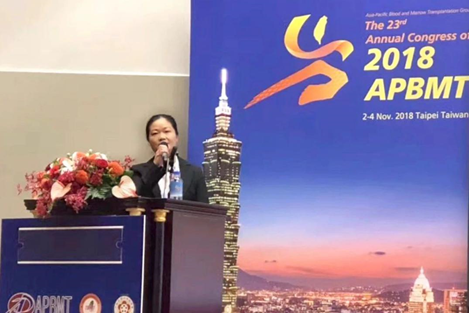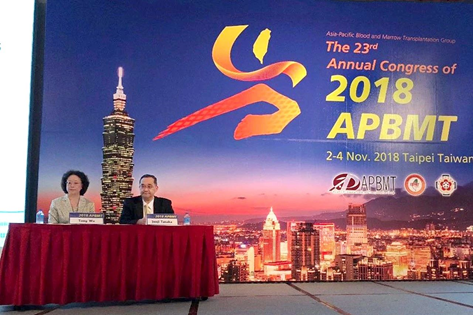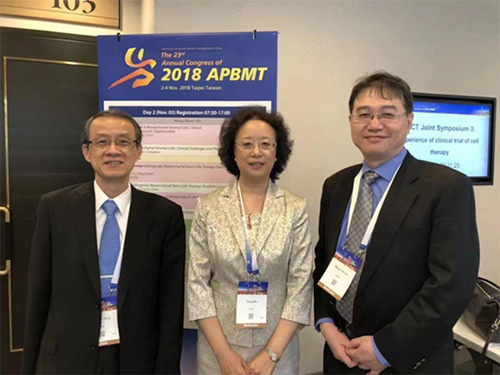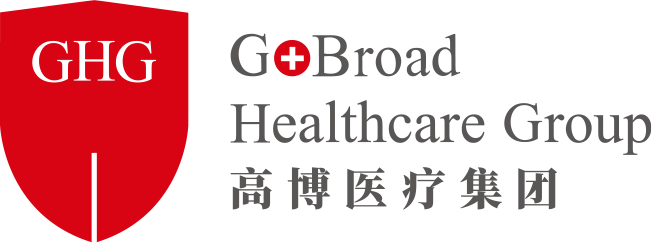Academic Trends | The Latest Achievements of the Transplantation Team in Beijing Boren Hospital Show Up at the 23rd Asia-Pacific Blood and Marrow Transplantation Conference
Following one keynote speech and three poster reports at the 15th National Academic Conference of Hematology, Beijing Boren Hospital once again brought outstanding academic achievements to the 23rd Asia-Pacific Blood and Marrow Transplantation (APBMT) Conference only one week later.
On November 2-4, 2018, the 23rd APBMT conference was held in Taipei, and more than 600 experts in bone marrow transplantation and related fields from more than 20 countries in the Asia-Pacific region attended the conference and made rich and sufficient academic communications. Director Tong WU from our hospital attended the conference as a special guest, participated in the working conference of the academic committee, served as a host expert and participated in the commemoration of the 25th anniversary of the Taiwan Tzu Chi Stem Cell Center. It is worth noting that Dr. Yan ZHANG, from the Department of Hematology II of our hospital, gave an oral speech on behalf of the transplantation team at this conference to exhibit our results on allogeneic hematopoietic stem cell transplantation (Allo-HSCT) for refractory/relapsed B-cell acute lymphoblastic leukemia (B-ALL) after CART cell therapy.

Photo of Director Tong WU (first from the left), Dr. Yan ZHANG (second from the left) and Dr. Yanzhi SONG (first from the right)
Dr. Yan ZHANG's paper "Allogeneic Hematopoietic Stem Cell Transplantation for Refractory/Relapsed B-Cell Acute Lymphoblastic Leukemia after CART Cell Therapy" stood out from the papers in many countries, as one of the oral reports of 27 papers at the conference. After Dr. Yan ZHANG gave a speech on the research progress, many experts raised questions and made discussions enthusiastically, and the participating experts highly appreciated the excellent achievements of Beijing Boren Hospital in bridging Allo-HSCT for refractory/relapsed B-ALL after CART therapy.

Dr. Yan ZHANG gave a speech at the conference
In the report, Dr. Yan ZHANG introduced that CD19-CART cell therapy showed good efficacy on refractory/relapsed B-ALL. However, there are still different opinions on whether Allo-HSCT should be performed after CART therapy to achieve persistent CR. Some studies have shown that if bridging transplantation is not performed when CR is achieved after CD19-CART therapy, some patients will develop CD19-negative relapse within 3-6 months; while a study has shown that the 6-month overall survival rate is similar in patients undergoing or not undergoing Allo-HSCT after CART therapy (79% vs. 80%). However, only a few patients (4-13) underwent allo-HSCT after CART therapy in the published relevant studies. Therefore, we analyzed the results of bridging Allo-HSCT in 36 patients with refractory/relapsed B-ALL who achieved CR or CRi after CART therapy from August 2017 to August 2018 (30 received CD19-CART, and 6 received CD22-CART), to evaluate the efficacy and safety of bridging transplantation after CART therapy.
The median age of patients was 8 (1-42) years old, and 9 patients (25%) had abnormal cytogenetic or molecular level of poor prognosis, including 4 cases of TP53 mutation/deletion, 1 case of FLT3-TKD mutation, 1 case of BCR-ABL1, 1 case of MLL-AF4, 1 case of complex karyotype and 1 case of chromosome monomer karyotype. These patients underwent Allo-HSCT when CR/CRi was achieved after CART cell therapy, and the median time from back infusion of CART cells to Allo-HSCT was 53 (34-98) days. Most patients (n=28, 77.8%) underwent related haploidentical transplantation, 6 underwent identical sibling transplantation, and 2 underwent unrelated donor transplantation. Graft-versus-host disease (GVHD) and infection were prevented routinely after transplantation.
Results: Seven patients (19.4%) had CMV infection, 6 (16.7%) had EBV infection, and 11 (30.6%) had hemorrhagic cystitis. The incidence of acute GVHD was 25% (I° in 5 cases, II° in 3 cases, and III° in 1 case), and 2 patients developed chronic GVHD. The median follow-up time was 200 (105-353) days, and 34 patients survived. The 6-month overall survival rate was 96.9%. Five patients (13.9%) relapsed after transplantation, 2 of whom died due to relapse, and the other 2 achieved CR again after receiving CD22-CART therapy. The 6-month overall leukemia-free survival rate was 91.7%.
After reporting the overall study data, Dr. Yan ZHANG shared a typical case with the participants. A 25-year-old female patient was diagnosed with B-ALL in February 2014 and relapsed in September 2017, 70% of bone marrow cells were leukemia cells, with complex karyotypes, and chemotherapy was ineffective. On November 20, 2017, the patient received CD22-CART therapy, the disease was evaluated as CR at 15 and 30 days after treatment, and residual leukemia was not detected. On January 17, 2018, myeloablative pretreatment was given; on January 29-30, the sister haploidentical transplantation was performed, the hematopoietic reconstitution was successful, and no GVHD and infection occurred after transplantation; currently, the disease-free survival reached 9 months.
Finally, Dr. Yan ZHANG concluded that our preliminary clinical results indicated that the current treatment strategy resulted in excellent treatment outcomes for these patients with refractory/relapsed B-ALL who previously had little hope for cure, the 6-month overall survival rate was 96.9%, and the disease-free survival rate was 91.7%. Therefore, rapid bridging Allo-HSCT and the adopted appropriate haploidentical transplantation protocol after CR was achieved by CART therapy were the key factors for good efficacy of transplantation.

Tong WU (left) served as the host expert at the conference
As a member of APBMT and a member of the Academic Committee, Director Tong WU was invited to attend the conference and served as a guest host of the oral speech unit on transplantation complications and other issues.
At the conference, Director Tong WU exchanged views with the doctors in Department of Hematology and Department of Pediatrics in National Taiwan University Hospital. It was learnt that a child with B-ALL relapsed after transplantation in the National Taiwan University Hospital and was transferred to Beijing Boren Hospital for treatment due to no response to traditional treatment. The immunotherapy team led by Director Chunrong TONG in our hospital achieved CR after CART therapy! The minimal residual leukemia was zero! In the recent examination, CART cells could still be detected in the body, and the next step is to use sequential immunotherapy to achieve cure.

Director Tong WU is exchanging opinions with the doctors in Department of Hematology and Department of Pediatrics in National Taiwan University Hospital
Doctors on both sides of the strait discussed the treatment of relapse after transplantation, and everyone was excited about the the outcome of immunotherapy in this child! Academic research is borderless, the spirit of sincere cooperation between the two sides in academic and clinical research has greatly encouraged the doctors and enhanced their confidence in treating patients!
Request an Appointment
Whether you are ready to make an appointment now or have questions for our expert team, we are standing by to help.
Email: international.service@gobroadhealthcare.com Phone: +86 010-83605002/010-83605200 Online Access
















